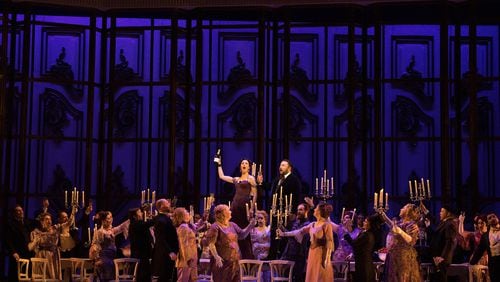Few theatergoers will leave the Atlanta Opera’s new production of “La Traviata” wondering why it’s one of the most enduringly popular operas of all time. The production, created in collaboration with the Washington National Opera where it premiered in 2018, is an appealing, dramatically satisfying show, and although it includes several intriguing innovations, for the most part, it wisely lets Verdi’s great work itself do the talking.
Director Francesca Zambello moves the opera in time from the beginning of the 19th century to the beginning of the 20th. It's an interesting and productive—if not an overwhelmingly consequential or earth-shaking—move. Designer Jess Goldstein's lovely costumes have a sleeker, more glamorous and supple look than the typical flowery hoop skirts, and the pleasure-loving Violetta makes for an interesting, believably independent, modern woman. Her Parisian society isn't just filled with the usual tuxedoed and bejeweled aristocrats, but with a suggestive mix of oddball artists, eccentrics and elites.
Most effectively, Violetta’s illness and death play out in a dreary institution, a modern hospital shown in scenes which open and close the show, effectively turning the bookended action into a flashback remembered from a sick bed. The innovation works best during the overture. The curtain rises, not on the expected grand Parisian drawing room, but on designer Peter Davison’s sick ward, simultaneously bright, drab and antiseptic, with spooky nuns and uninformed doctors somberly presiding over the sick and dying. The hospital also makes an effective setting for the ending, with Alfredo seemingly arriving from another, distantly remembered world to be by Violetta’s side. (Far less effective is the use of the hospital scenery in the middle of Act 1 as Violetta’s party comes to an end: the intrusion seems an unnecessary reminder of the device itself, and it somewhat confusingly blends elements of the past and the present, the real and the remembered, together on stage).
Still, as a director, Zambello primarily seeks to draw out the emotional heart and human drama of the story, bringing to vivid life both the small moments and the overarching thrust of the tragic story. Conductor Arthur Fagen similarly obliges by drawing out beautiful warmth and lovely detail from the orchestra. In the wrong hands, dynamic passages of “La Traviata” can sound bouncy and circus-like, and the sorrowful passages can become melodramatic and strained, but Fagen keeps things admirably on track, staidly reigning in the bounce and always evoking the real tragedy and genuine emotion, the deadly seriousness, at the heart of Verdi’s music. Small quiet moments, such as Alfredo’s discovery of Violetta’s letter, pop alive with tension and emotion through the music.
On opening night, leads Zuzana Marková as Violetta and Mario Chang as Alfredo didn’t elicit much heat or excitement in a restrained rendition of their opening duet, but they more than made up for it in the intimacy and loveliness of what followed. Dramatically, Marková’s Violetta comes across as alert and intelligent, existential in her understanding of her situation; she delights in society, enjoys becoming the center of its noisy storm, but remains its ultimate outsider, fully aware of her position. These are qualities that the Czech soprano, making her American debut, evokes especially well in a darkly contemplative and solitary “Ah, fors’e lui” in Act 1. Her sense of both softness and fortitude, vulnerability and strength, during Act 2’s “Ah! Dite alla giovine” comes across beautifully, as well. Chang brings out Alfredo’s impulsiveness and his intensity. His outrageous initial devotion for Violetta comes across as believable, as does his sudden turn from naive devotion to rage and revenge in Act 2. In duets, both he and Marková shine exquisitely in quiet, delicate bel canto passages.
Also, especially of note is a strong performance by Fabian Veloz as Alfredo’s father, Giorgio Germont. His lush baritone gives the character emotional depth and a sort of wistful, forbearing, presiding wisdom. His “Di Provenza il mar” sounds heartfelt and convincing, and his distant admiration for Violetta, even as he destroys her life, emerges as an especially touching element of the drama in the Act 2 arias the two characters share.
In recent seasons, the Atlanta Opera has shown a new adeptness at presenting classic works and at leading Atlanta audiences into more innovative territory. Audiences will get a satisfying taste of both in this fine production of “La Traviata” as the 2018-19 season comes to a close.
OPERA REVIEW
The Atlanta Opera presents “La Traviata”
7:30 tonight; 8 p.m. Friday 3 p.m. May 5. $38-$134. Cobb Energy Performing Arts Centre, 2800 Cobb Galleria Parkway, Atlanta. 404-881-8885, atlantaopera.org.






